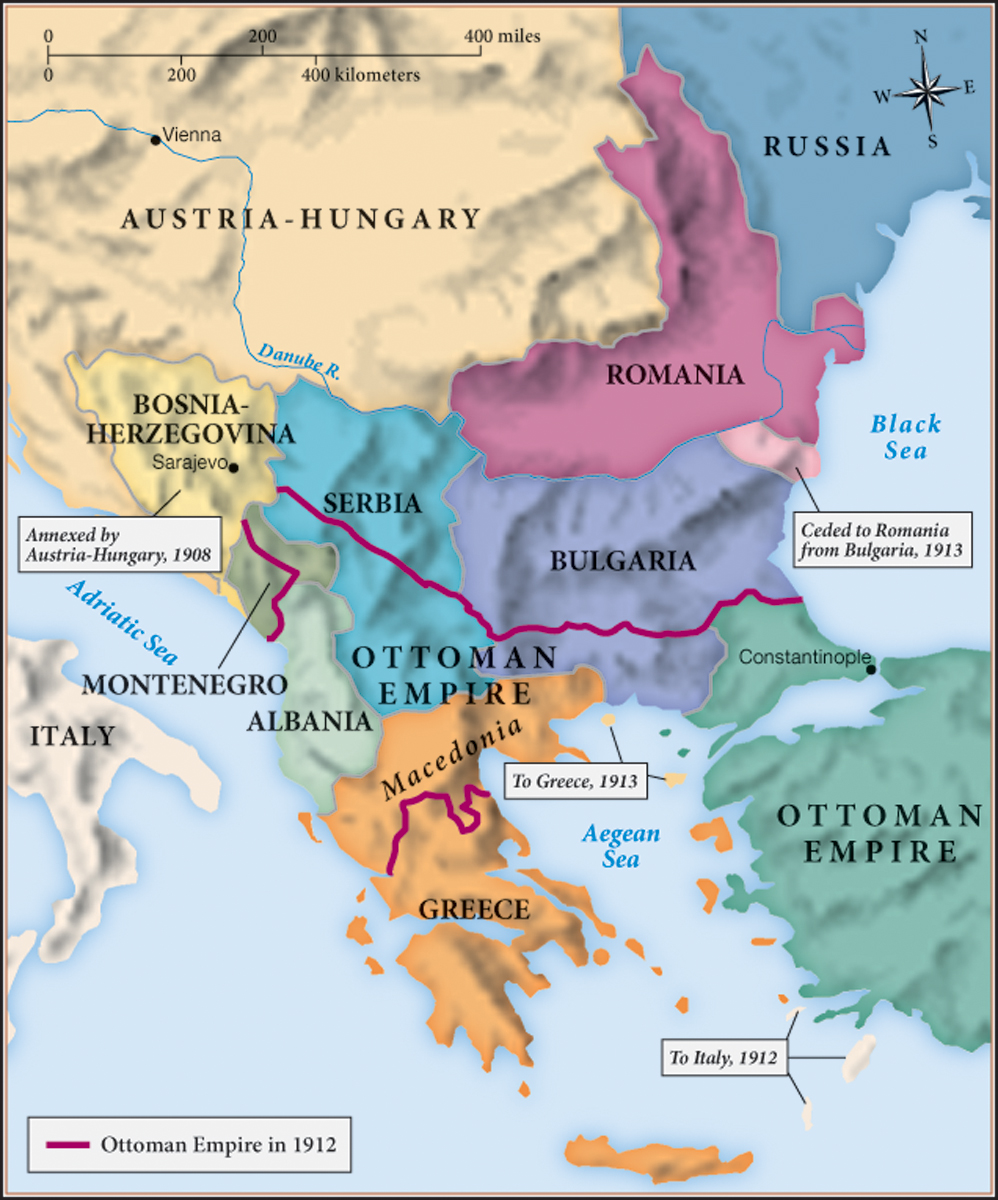Competing Alliances and Clashing Ambitions
Printed Page 810
Important EventsCompeting Alliances and Clashing Ambitions
As the twentieth century opened, the Triple Alliance that Bismarck had negotiated among Germany, Austria-Hungary, and Italy confronted an opposing alliance between France and Russia, created in the 1890s. The wild card in the diplomatic scenario was Great Britain, traditional enemy of France, especially in the contest for global power. Britain and France—constant rivals in Africa—edged to the brink of war in 1898 over competing claims to Fashoda, a town in the Sudan. The threat of conflict led France to withdraw, showing both nations as embracing a truce out of mutual self-interest. To prevent another Fashoda, they entered into secret agreements, the first of which (1904) recognized British claims in Egypt and French claims in Morocco. This agreement marked the beginning of the British-French alliance called the Entente Cordiale. Still, French statesmen feared that, should war break out, their ally might decide to remain neutral.
Kaiser William II inflamed the diplomatic atmosphere just as France and Britain were developing the Entente Cordiale. After victory in the Franco-Prussian War, Bismarck had proclaimed Germany a “satisfied” nation and worked to avoid further wars. William II, in contrast, was emboldened by Germany’s growing industrial might and announced in 1901 that Germany needed greater global power to be achieved by “friendly conquests.” His actions, however, were far from friendly, and he used the opportunity presented by the defeat of France’s ally Russia in 1904–1905 to contest French advances in Morocco. A boastful, blustery man who was easily prodded to rash actions by his advisers, William landed in Morocco in 1905 to block the French. To resolve what became known as the First Moroccan Crisis, an international conference met in Spain in 1906. There the powers upheld French claims in North Africa. France and Britain, encountering German interference in Morocco, drew closer together.
When the French took over Morocco completely in 1911, Germany triggered the Second Moroccan Crisis by sending a gunboat to the port of Agadir and again demanding concessions from the French. This time no power—not even Austria-Hungary—backed Germany. The British and French now strengthened the Entente Cordiale, and Germany, smarting from its setbacks on the world stage, refocused on its own alliances.
Germany’s bold territorial claims unsettled the rest of Europe, particularly the Balkans. German statesmen began envisioning their creation of a Mitteleuropa—a term that literally meant “central Europe” but in their minds also included the Balkans and Asia Minor. The Habsburgs, firmly backed by Germany, judged that their own expansion into the Balkans and the resulting addition of even more ethnic groups would weaken the claims of any single ethnic minority in the Dual Monarchy. Russia, however, saw itself as the protector of Slavs in the region and wanted to replace the Ottomans as the dominant Balkan power, especially since Japan had crushed Russian hopes for expansion to the east. Austria’s swift annexation of Bosnia-Herzegovina during the Young Turks’ revolt in 1908 enraged not only the Russians but the Serbs as well, who wanted Bosnia as part of an enlarged Serbia (Map 24.4).

Even without the many greedy eyes cast on the Balkans, the situation would have been extremely volatile. The nineteenth century had seen the rise of nationalism and ethnicity as the basis for the unity of the nation-state, and by late in the century, ethnic loyalty challenged the dynastic rule of the Habsburgs and Ottomans in the region. Greece, Serbia, Bulgaria, Romania, and Montenegro emerged as autonomous states. All of them sought more Ottoman and Habsburg territory to cement a common ethnicity—an impossible desire given the dense intermingling of ethnicities throughout the region. Nonetheless, war for territory was on these nationalists’ agenda.
In the First Balkan War, in 1912, Serbia, Bulgaria, Greece, and Montenegro joined forces to gain Macedonia and Albania from the Ottomans. The victors divided up their booty, with Bulgaria gaining the most territory, but in the Second Balkan War, in 1913 Serbia, Greece, and Montenegro contested Bulgarian gains. The quick victory of these allies increased Austria’s concern at Serbia’s rising power. The region had become perilous: both Austria-Hungary (as ruler of many Slavs) and Russia (as their would-be protector) stationed increasing numbers of troops along the borders. The situation led strategists to think hopefully that a quick war there—something like Bismarck’s brief wars—could resolve tension and uncertainty.